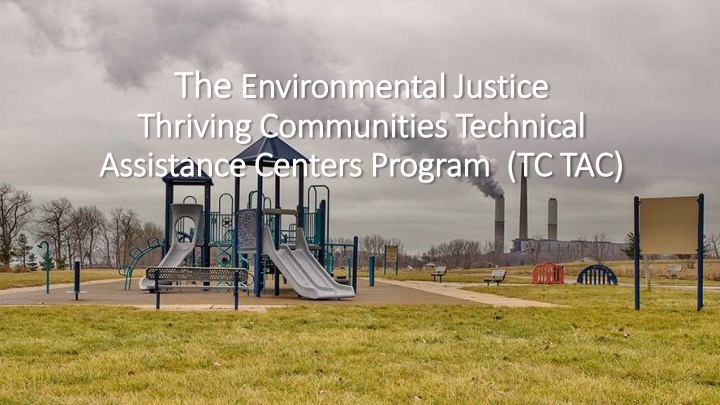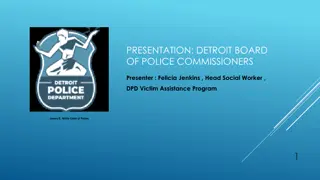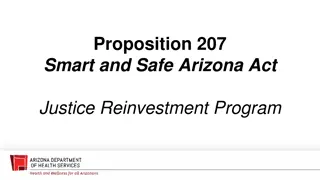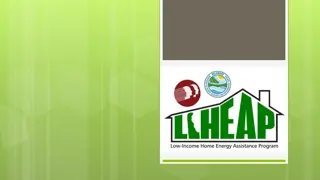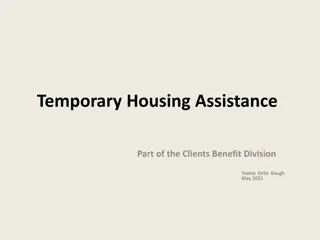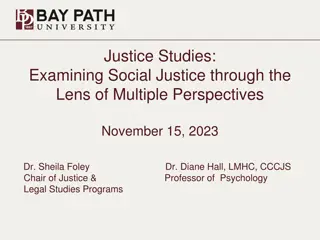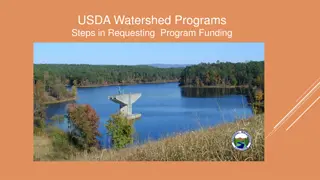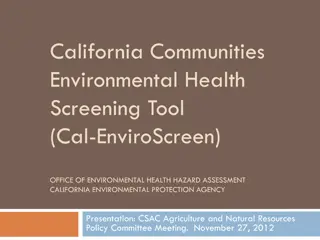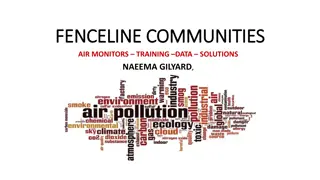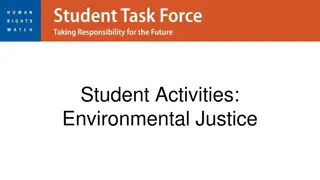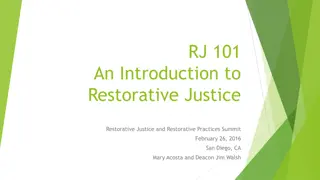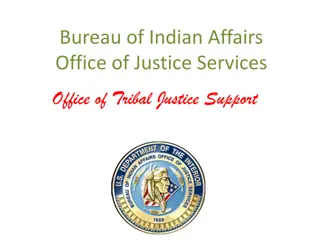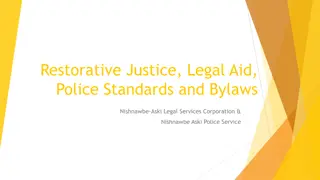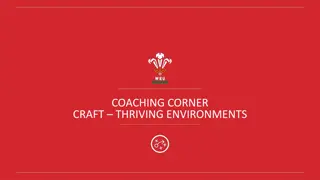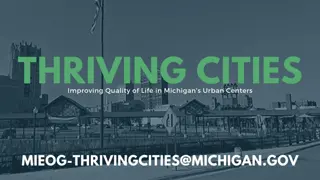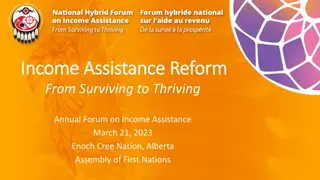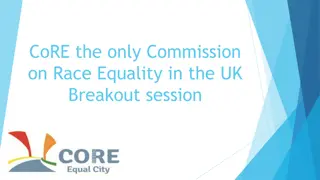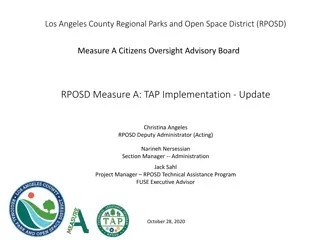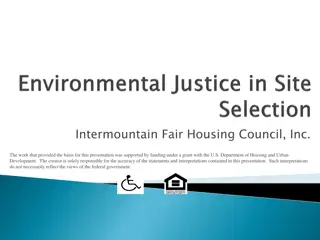Environmental Justice Thriving Communities Technical Assistance Program Overview
The Environmental Justice Thriving Communities Technical Assistance Centers Program (TC TAC) provides $2.8 billion for financial assistance, with a focus on benefiting disadvantaged communities through pollution remediation, workforce development, climate adaptation, and more. Grants must be implemented within 5 years and are open to community-based nonprofit organizations and partnerships. Technical assistance is available for eligible grantees.
Download Presentation

Please find below an Image/Link to download the presentation.
The content on the website is provided AS IS for your information and personal use only. It may not be sold, licensed, or shared on other websites without obtaining consent from the author.If you encounter any issues during the download, it is possible that the publisher has removed the file from their server.
You are allowed to download the files provided on this website for personal or commercial use, subject to the condition that they are used lawfully. All files are the property of their respective owners.
The content on the website is provided AS IS for your information and personal use only. It may not be sold, licensed, or shared on other websites without obtaining consent from the author.
E N D
Presentation Transcript
The The Environmental Justice Environmental Justice Thriving Communities Technical Thriving Communities Technical Assistance Centers Program (TC TAC) Assistance Centers Program (TC TAC)
Clean Air Act Section 138 Clean Air Act Section 138 Overview Overview $2.8 Billion for financial assistance: $200 Million technical assistance for implementation All grants must benefit disadvantaged communities as defined by the EPA Administrator Awards for grants eligible until September 30, 2026
Clean Air Act Section 138 Clean Air Act Section 138 Overview Overview Grants activities generally including: Pollution remediation and prevention Workforce development tied to air pollution and greenhouse gas reductions Climate adaptation and resiliency Indoor air pollution, mitigating climate and health heat related issues Facilitating engagement of governmental processes disadvantaged communities in Provide Technical assistance to eligible grantees
Clean Air Act Section 138 Clean Air Act Section 138 Overview Overview All grantee proposals must be implemented within All grantee proposals must be implemented within 5 years Eligibility Eligibility limited limited to: to: 5 years Community-based nonprofit organization Partnership of community-based nonprofit organizations Partnership between: Indian tribe, a local government, or an institution of higher education; and A community-based nonprofit organization
Grants and Technical Assistance Implementation E&CJ Change Grants Evaluation and Reporting Technical Assistance Pilots and Partnerships Planning & Project Development EJ Collaborative Problem-Solving Grants (EJ-CPS) EJ Government to Government Grants (EJ- G2G) Assessment Thriving Community Technical Assistance Centers (TCTACs) Assessment Grants Planning Grants Project Development Grants Technical Assistance
Technical Assistance, Technical Assistance, Application, and Evaluation Evaluation Application, and Technical Assistance: Provide support application development and grant writing, reporting and bookkeeping, networking, marketing plans and communications, leadership development training for nonprofits, budget for outreach, and more Application processes: Provide options and let organization self- determine, have different scales of funding for varied organizations, clear and transparent scoring, have line-item budgets, simplified checklists, and more Evaluation and Reporting: Track immediate and long-term community benefits, track impacts by sectors, track cumulative impacts, track quality of community engagement and associated outcomes
TCTAC Programmatic Goals and Outcomes Work across multiple sectors in one area/community Be flexible on eligible entities and evaluate depth of connection to community* Government and community work together to co-collaborate and co-create solutions Prevent displacement Community engagement in all projects, including clean energy Wrap-around services and education included with infrastructure projects Connect workforce to all projects Multi-pronged approach centered on resilience, including: Housing preservation Clean air and water Green jobs Behavorial and physical health Short-term and long-term solutions Communities involved in all decisions and projects are community-designed Benefits are clear to the community Build community capacity, including project management and leadership development
Strategies and Projects that provide most benefits to disadvantaged communities Integrate health outcomes and health access into all projects Projects that are connected to a resource and/or resilience hub Infrastructure projects that have programs connected to them Invest in people as infrastructure (social workers, health workers) Support the development of supportive networks Make sure there is an integrated one-stop-shop for all projects
Strategies and Projects that provide most benefits to disadvantaged communities Climate resilience: Addressing tree canopy, decarbonized heating and cooling centers, upgrading/retrofitting buildings and housing, alert warning systems, clean energy and community power systems, and more Mitigating indoor and outdoor pollution: beauty salon certification and training, address causes that lead to pollution such as mold and artificial turf issues, replace gas appliances with electric, and more Workforce development: Address barriers, including bad credit, lack of access to personal identification or bank accounts, provide reentry support for formerly incarcerated, and provide wrap-around services and a focus on life skills development. Creating training programs related to: Reducing energy use at home Mitigating air and other pollution, and more
Facilitating engagement of disadvantaged communities in federal, state, and other public processes Focus efforts on reducing disparities, including: Poverty levels, education attainment, legal status, health disparities, geography, unemployment, environmental stressors, and social determinants of health Prioritize: Culturally-relevant outreach Feedback loops, learned apathy, and transparency Compensate residents for participation Ensure proper access, including childcare and transportation Active, ongoing outreach to most marginalized Ensure: Local leaders are educated and trained properly by the EPA Language is equivalent to fourth grade reading level Value lived experience
TCTAC Background The formation of the EJ technical assistance centers, in partnership with the Department of Energy, is in direct response to feedback from communities and environmental justice leaders who have asked for readily accessible technical assistance to help with their long-term EJ goals and to help build their capacity to access federal and other resources. With this program there are 14 regionally and 3 nationally based TCTACs featuring over 160 partners to provide assistance benefiting communities throughout the US. National TCTACS: Each will coordinate with the Regional TCTACs, develop national databases/clearinghouses, host TCTAC summits, etc. Regional TCTACS: Each will provide direct support and TA to communities and stakeholders in specific regional/geographic area(s)
Managing federal grants (e.g., accounting, policies, controls) Grant proposal writing and preparation assistance. TCTAC Service Examples Navigate SAM.gov and Grants.gov registration process and other portals related to grants. Identify funding sources to apply for (federal, state, local, private) Developing partnerships and coalitions to conduct outreach.
Region 3 TCTAC National Wildlife Federation (NWF) (Project Lead & Co- facilitator) The Center for Community Engagement, Environmental Justice, and Health (CEEJH), and the University of Maryland Environmental Finance Center (UMD EFC). (Co-facilitator) Region 3 Partners Centro De Apoyo Familiar (CAF) (VA) South Baltimore Community Land Trust (MD) Overbrook Environmental Education Center (PA) Sussex Health & Environmental Network (DE) Sentinels of Eastern Shore Health (MD), and Empower DC. Morgan State University (MD) will serve as the primary HBCU Hub. West Virginia State University (VA) will act as a hybrid HBCU and community Hub. 1. 2. 3. 4. 5. 6. 7. 8.
To inquire about technical assistance or to volunteer as a Region 3 service provider: Please call: (202) 792-5350 or 1-800-757-1405 Website: https://www.nwf.org/Our-Work/Environmental- Justice/Region-3-TCTAC Intake Form: https://airtable.com/appZGWGjVj5Q6UGWc/paghQkRVx CrKUI3nq/form To Subscribe to the mailing list: http://eepurl.com/iDtc16
Overbrook Environmental Education Center 6134 Lancaster Avenue Philadelphia, PA 19151 www.overbrookcenter.org 215.879-7770
